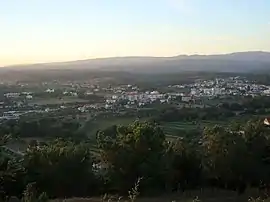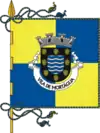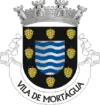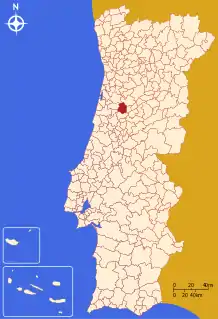Mortágua
Mortágua (Portuguese pronunciation: [muɾˈtaɣwɐ] or [mɔɾˈtaɣwɐ] (![]() listen)) is a municipality in the district of Viseu, Portugal. The population in 2011 was 9,607,[1] in an area of 251.18 km².[2]
listen)) is a municipality in the district of Viseu, Portugal. The population in 2011 was 9,607,[1] in an area of 251.18 km².[2]
Mortágua | |
|---|---|
 View of Mortágua valley | |
 Flag  Coat of arms | |
 | |
| Coordinates: 40°26′N 8°14′W | |
| Country | |
| Region | Centro |
| Intermunic. comm. | Região de Coimbra |
| District | Viseu |
| Parishes | 7 |
| Government | |
| • President | José Júlio Norte (PPD-PSD) |
| Area | |
| • Total | 251.18 km2 (96.98 sq mi) |
| Population (2011) | |
| • Total | 9,607 |
| • Density | 38/km2 (99/sq mi) |
| Time zone | UTC±00:00 (WET) |
| • Summer (DST) | UTC+01:00 (WEST) |
| Local holiday | Holy Thursday |
| Website | http://www.cm-mortagua.pt/ |
The present mayor is José Júlio Norte, elected in 2013 by the Social Democratic Party.
History
Legend suggests that that village was formed on a lake; settlers recalled that Água Morta (dead water) existed here, but no physiological evidence remains of the body of water.[3] Over time, the name stayed and evolved, becoming the variant today of the local municipality.
About 1 kilometre (0.62 mi) from the main village is a hill, covered in vegetation, but whose lateral flank was occupied by a Moorish settlement known as Crasto.[3] Over a cliff archeologists discovered several homes including a building that was defined as a kitchen, on its edge.[3]
By 1895, several chapels were situated on this hilltop, which had become known as Cabeça da Senhora do Mundo (owing to the existence of an image to that invocation).[3]
Geography
Administratively, the municipality is divided into 7 civil parishes (freguesias):[4]
- Cercosa
- Espinho
- Marmeleira
- Mortágua, Vale de Remígio, Cortegaça e Almaça
- Pala
- Sobral
- Trezói
References
Notes
- Instituto Nacional de Estatística
- "Áreas das freguesias, concelhos, distritos e país". Archived from the original on 2018-11-05. Retrieved 2018-11-05.
- J.L. de V. (1895), p.10
- Diário da República. "Law nr. 11-A/2013, page 552 78" (pdf) (in Portuguese). Retrieved 28 July 2014.
Sources
- J.L. de V., "Antiguidades de Mortágua", O Arqueólogo Português (PDF) (in Portuguese) (Série 1 ed.), Lisbon, Portugal: DGPC, p. 10